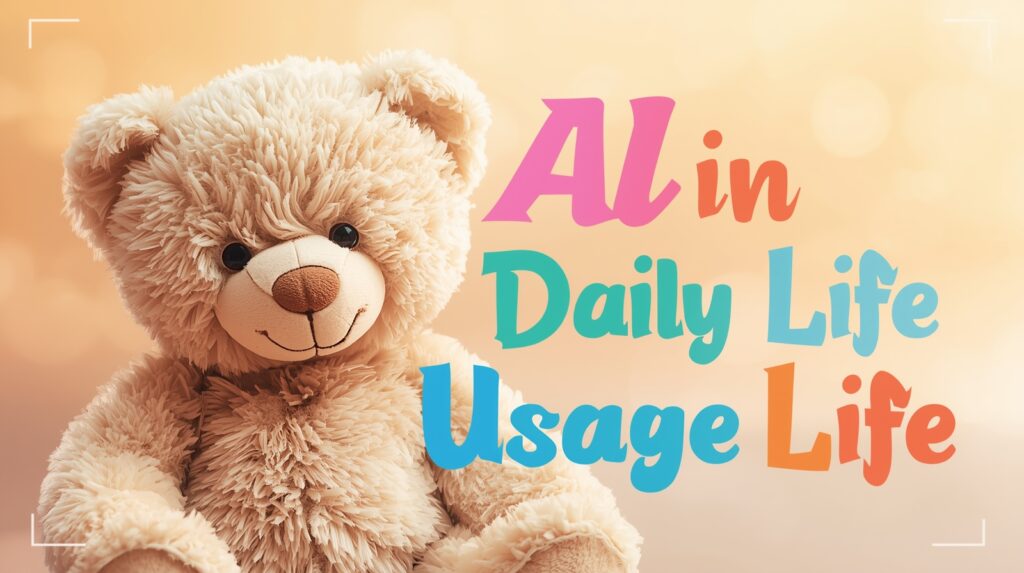Artificial Intelligence (AI) has evolved from being a future concept to becoming a part of our daily life. From voice assistants in smartphones to recommendation engines on streaming platforms, AI silently underpins many of the products and services we rely on every day. Its influence extends beyond technology, affecting healthcare, education, banking, transportation, and even home tasks.

What is AI in Daily Life?
Artificial Intelligence refers to the ability of robots and software to simulate human intelligence—learning, thinking, and problem-solving. When implemented in daily life, AI helps us save time, boost productivity, and make smarter decisions. Unlike traditional computing, AI systems learn from experience and develop smarter over time, making them highly effective for regular jobs and difficult problem-solving alike.
Everyday Examples of AI Usage
1. Smartphones and Personal Assistants
Most individuals meet AI through their smartphones. Features such as voice assistants (Siri, Alexa, Google Assistant), predictive text, and facial recognition rely significantly on AI. For instance, when you say, “Set a reminder at 6 PM”, AI analyzes your voice, evaluates the instruction, and executes the operation promptly.
2. Social Media Platforms
AI controls the algorithms underpinning Facebook, Instagram, TikTok, and X (previously Twitter). These programs evaluate your behavior—what you like, share, or watch—and personalize your feed. AI also detects spam, filters hazardous information, and recommends new friends or pages you may love.
3. Online Shopping
When you browse online at Amazon or eBay, AI records your browsing behavior and offers things you’re likely to buy. Personalized suggestions are a direct product of machine learning. Chatbots also employ AI to handle client queries 24/7.
4. Streaming and Entertainment
Platforms like Netflix, YouTube, and Spotify rely on AI recommendation systems. By researching your watch history, they estimate what you’d like to see or hear next. This not only enhances user experience but also keeps you interested longer.
5. Smart Homes
AI has changed households with smart devices like thermostats, lighting systems, and security cameras. Products such as Google Nest or Amazon Echo change room temperature, turn off lights, or monitor your home—all based on AI-driven automation.

6. Navigation and Transportation
Navigation programs such as Google Maps and Waze employ AI to calculate the fastest routes, estimate traffic, and propose alternate paths. Similarly, ride-hailing applications like Uber and Lyft depend on AI for efficient driver-passenger matching. Self-driving cars, still in development, are another significant AI innovation.
7. Healthcare Applications
AI in healthcare improves daily life by enabling fitness trackers, smartwatches, and health apps. Devices like Apple Watch and Fitbit track heart rates, sleep cycles, and physical activity. AI also enables telemedicine apps that recommend therapies or link patients to doctors online.
8. Finance and Banking
AI has become a crucial player in banking and personal finance. Chatbots answer banking requests, fraud detection systems alert suspicious activity, and robo-advisors propose investments based on user goals. Mobile payment apps also employ AI to assure secure transactions.
9. Education and Learning
AI facilitates individualized learning through apps like Duolingo or Khan Academy. Virtual tutors, smart classrooms, and AI-powered grading systems make education more adaptive and accessible.
10. Work and Productivity Tools
AI-based software like Grammarly, Notion, and Google Workspace helps users write better, manage projects, and communicate more efficiently. Many organizations also use AI to evaluate resumes and organize interviews.
Benefits of AI in Daily Life
1. Saves Time and Effort
AI automates monotonous tasks—like sorting emails, setting alarms, or finding directions—freeing up time for more vital pursuits.
2. Personalization
From shopping ideas to customized music, AI makes daily living more personalized to individual interests.
3. Improved Safety and Security
AI boosts online and offline safety by identifying fraud, monitoring suspicious activity, and powering home security systems.
4. Accessibility
AI technology such as speech-to-text and text-to-speech enable people with disabilities navigate daily chores with ease.
5. Cost Efficiency
By automating customer service or medical consultations, AI decreases expenses for businesses and customers.
Challenges of Using AI in Daily Life
Despite its advantages, AI application in daily life is not without challenges:
- Privacy Concerns: AI collects vast volumes of data, creating fears about misuse or illegal access.
- Job Displacement: Automation may displace certain positions, notably in customer service or data entry.
- Bias and Fairness: AI systems can occasionally replicate human biases present in the data they are trained on.
- Dependence on Technology: Over-reliance on AI may impair critical thinking and decision-making skills in humans.

The Future of AI in Everyday Life
As AI continues to advance, its role in daily life will expand. Some major trends to observe include:
- Self-Driving Cars: Fully autonomous vehicles may become ubiquitous, reducing road accidents and traffic.
- Smart Healthcare: AI will predict diseases earlier and give more individualized treatments.
- AI in Education: Virtual classrooms and AI instructors will become a commonplace in schools globally.
- Robotics at Home: From cleaning to cooking, household robots will undertake more regular activities.
- Augmented Reality (AR) + AI: Shopping, gaming, and learning experiences will mix AI with AR for immersive daily use.
Final Thoughts
Artificial Intelligence is no longer isolated to labs or science fiction—it’s woven into our daily routines, often without us even recognizing it. Whether it’s using a navigation app to avoid traffic, streaming a personalized music, or asking Alexa to dim the lights, AI has become an invisible assistant in our lives.
The future of AI in daily life offers even greater convenience, efficiency, and personalization. However, it also demands appropriate rules to safeguard privacy, fairness, and ethical use. With the appropriate balance, AI will continue to improve the quality of everyday living for people across the globe.



